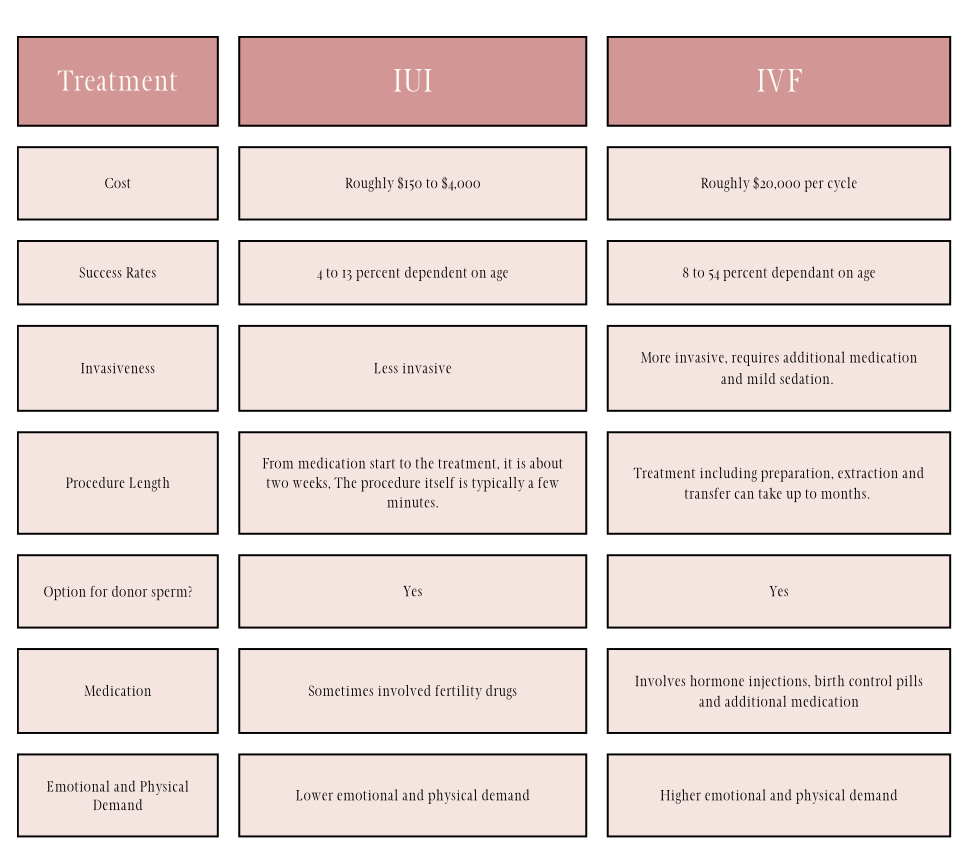If you’re navigating infertility, we know researching and exploring fertility treatments can be very overwhelming. You might feel scared or anxious about making the right decision for you.
Two of the most common treatment options you might come across in your research and discussions with your healthcare team are in vitro fertilization, or IVF and intrauterine insemination, or IUI. Both of these options can help you work through infertility and towards a baby, but they are vastly different in how they actually work and which one is right for you. IVF involves extracting, fertilizing and then implanting the embryos into a woman’s uterus. While IUI involves putting sperm directly into the uterus in hopes of fertilization.
We want to help you understand the difference between IUI and IVF to make the right decision for you. By comparing and contrasting IUI and IVF, discussing the benefits and success rates of each, and looking into costs, we hope that this article can help you make a decision on which infertility treatment is best for your personal journey. By understanding the differences between IUI and IVF, you can make the best choice for you, your family and hopefully your future baby.
- Understanding IUI
- Understanding IVF
- IUI vs. IVF: A Comparison
- When to Consider IUI or IVF
What is IUI?
The process of IUI involves taking sperm and carefully placing it into a woman’s uterus with a small catheter. This treatment is done in hopes that with the increased amount of sperm in the uterus, one will reach the fallopian tubes and attach to an egg. Many same-sex couples, single mothers by choice and couples who are struggling with male factor infertility might opt for IUI.
If you are looking to receive an IUI treatment, you’ll start by meeting with a fertility specialist about your goals and medical history. The fertility specialist will conduct in-depth tests to ensure your fallopian tubes and uterus appear normal and will hopefully provide success for the IUI treatment.
After discussing a plan, the IUI process is as follows:
- Your healthcare team will monitor your ovulation stage by doing ultrasounds of your uterus to check the size and growth of your follicles. Sometimes, doctors will prescribe fertility medications to help stimulate ovulation.
- Your partner will provide your healthcare team with a sperm sample, and a laboratory will select the best-quality sperm from the sample. If you’re using donor sperm, you will need to choose the best fit for your genetics, purchase it from a donor bank and ensure it’s delivered to the fertility clinic to be properly dethawed and tested.
- Now that you’re ovulating and the sperm is ready, you’ll head to your procedure. Your doctor will open up your cervix with a speculum and insert a small tube to inject the sperm into your uterus. The whole process is over in just a few minutes and for most women, is mostly painless, albeit a little uncomfortable.
- Usually, two weeks after the procedure, your doctor will tell you to take a pregnancy test to determine if the IUI treatment was successful.
Success rates of IUI based on different factors
The success of IUI is based on a few different factors. First, your age. Your age impacts the success rate of IUI because as you get older, your egg quality declines. You should talk to your healthcare team about your individual odds of conceiving via IUI before deciding to go through with the procedure. Generally speaking, the success breakdown for your age after six cycles is below:
- Early 30s or younger: 20 to 25 percent success rate
- 30-35 years old: 15 to 20 percent success rate
- 35-40 years old: Ten percent success rate
- Early 40s and above: Five percent success rate
Fertility diagnosis can also impact how successful your IUI procedure is. If your egg count is low, you only have one healthy fallopian tube or your partner has an abnormal sperm count, it can impact your success rate. Additionally, if you choose to take fertility drugs, your success rate can increase.
Pros and Cons of IUI
- IUI is less invasive.
- It’s more affordable than other fertility treatments.
- It is a quick and usually painless procedure.
- You have to be ovulating.
- A sperm must have a certain level of motility, meaning it must be able to move and swim toward an egg.
- The fertility drugs you might need to take can cause side effects like mood swings, headaches, nausea and pelvic discomfort.
- It has a lower success rate but still is expensive and usually not covered by insurance.

What is IVF?
IVF is a great option for those women who have damaged fallopian tubes, endometriosis, uterus problems or unexplained infertility. When you meet with your healthcare provider to discuss IVF, they may start by prescribing birth control pills or estrogen. This will stop the growth of ovarian cysts and also help regulate your menstrual cycle, which can help your doctors increase your chances of mature eggs.
After discussing a plan with your doctor, the IVF process is as follows:
- You’ll start by taking injections of hormone medications that will help your eggs mature fully. The medication will also encourage a group of eggs to mature during your cycle instead of just the typical one you pass during your menstrual cycle.
- After monitoring these injections and your body’s response to them, your doctor will prescribe a final “trigger shot” if you’re ready to prepare for egg retrieval. This will happen 36 hours before your egg retrieval appointment.
- During egg retrieval, you’ll be under mild sedation or medication. A thin needle is guided into your ovaries through your vagina with the help of an ultrasound. The needle is connected to a suction device that will extract your eggs.
- Soon after extraction, an embryologist will fertilize your eggs with your partner’s or donor’s sperm.
- Your embryos will be monitored within the next week, and those suitable for transfer will be preserved or frozen, depending on your team’s recommendation. Some choose to do a fresh transfer within a few days of the egg retrieval, while others wait for the next cycle and do a frozen transfer.
- An embryo will then be inserted into your uterus through a thin catheter that is inserted through the vagina.
- If successful, your doctor will use a blood test to determine your pregnancy.
- The entire process takes about 6-8 weeks
Success rates of IVF based on different factors
Your success rate depends on so many factors. “You should first meet with a specialist, whether that’s a general OB/GYN or a Reproductive Endocrinologist, to help figure out what may be the cause of infertility, as this will help you and your doctor decide what is the best treatment to help you conceive. This may also involve having your partner see a urologist or male reproductive specialist, as 30%-40% of all infertility cases are primarily due to male factors, such as sperm quality and quantity,” Dr. Kerry Krauss, OB/GYN and Medical Director at Natural Cycles, explained.
The general success rate of IVF is around 20 to 35 percent, but success can vary based on a few different factors. The success of IVF is significantly influenced by your age. Your age impacts the success rate of IVF because as you get older, the rate of chromosomal abnormalities in your eggs and therefore embryos increases.
If you’re under 30 years old, the average success rate of IVD is 69.4 percent, whereas if you’re between 40 to 43 years old, your success rate drops to 9.4 percent. Your success rate also depends on which cycle of IVF you are in. Typically, as you have more IVF cycles, your chances of success increase.
Pros and Cons of IVF
- Higher success rates compared to IUI
- It can address a range of infertility issues, giving those who are unable to conceive naturally the option to grow their families.
- Provides more information on embryo quality and health, where IUI doesn’t provide any information.
- High risk of multiple pregnancies, which can increase your risk of complications.
- IVF is expensive and usually not covered by insurance
- The process can put a strain on your mental health.
- Increased chance of miscarriage and pregnancy complications, like subchorionic hematomas and more.
- Increased chance of miscarriage
IUI vs. IVF: A Comparison

As you choose between IUI and IVF, along with the above comparisons, you should consider other factors that can impact your success. As we’ve mentioned, age and increased fertility issues can affect your chances of success in each procedure.
While IVF has a higher success rate, the budget you will need is much larger, making IUI a more attractive option for many women looking for a more affordable option. When looking at finances, research if your employer has benefits or if your insurance helps cover some of these costs. You should also evaluate the emotional strain each procedure can take. Women undergoing IVF often have more anxiety or stress that can increase after each failed attempt with IVF.
When to Consider IUI or IVF
After evaluating all the differences between IVF and IUI, it can take time to decide. Your choice is deeply personal and will depend on the factors in your life. Consider your age, budget, fertility diagnosis, your ability to take on emotional and physical strains and your timeframe. All of these are so essential to making the right decision for you. Discussing your options, concerns and questions with a fertility specialist can help you decide.
“A fertility specialist plays a crucial role in helping patients choose between IUI and IVF by assessing individual medical histories, interpreting necessary tests, and evaluating specific fertility issues,” Dr. Janet Choi, board-certified reproductive endocrinologist, said. “They can provide personalized recommendations based on factors such as age, fertility diagnosis, previous treatment outcomes and current/ future family building needs, helping patients make informed decisions about their fertility journey.”
IUI and IVF differ in terms of the procedure approach, the cost, timeframe, emotional and physical toll and success rates. While IUI is less invasive and more affordable, it has lower success rates. IVF is a more invasive approach, but it has higher success rates and can be beneficial for those with more severe infertility struggles.
Remember, your choice between IUI and IVF depends on your lifestyle. This journey can be challenging but know that there are people who want to help you. Your healthcare provider and fertility specialists can offer advice and guidance on the best and most effective approach for you.
“Undergoing fertility treatments can also be extremely time consuming and stressful, so please make sure you have adequate support during this time from your therapist, parents, loved ones, friends and family,” Dr. Krauss said.
Whether you’re just starting your journey or looking at new options, remember that so many women are precisely in your shoes. Lean on your loved ones during this time and trust in yourself that you’ll make the right choice.
Author
-

Esha Minhas is a third-year student at Northeastern University studying Journalism and Political Science. She's currently the editorial and social intern for Mila & Jo Media. Esha is also the Deputy Sports Editor for The Huntington News and covers Northeastern men's hockey. When she's not busy with work or school, you can find her at the gym, baking for her friends and family and watching anything sports related.
View all posts





